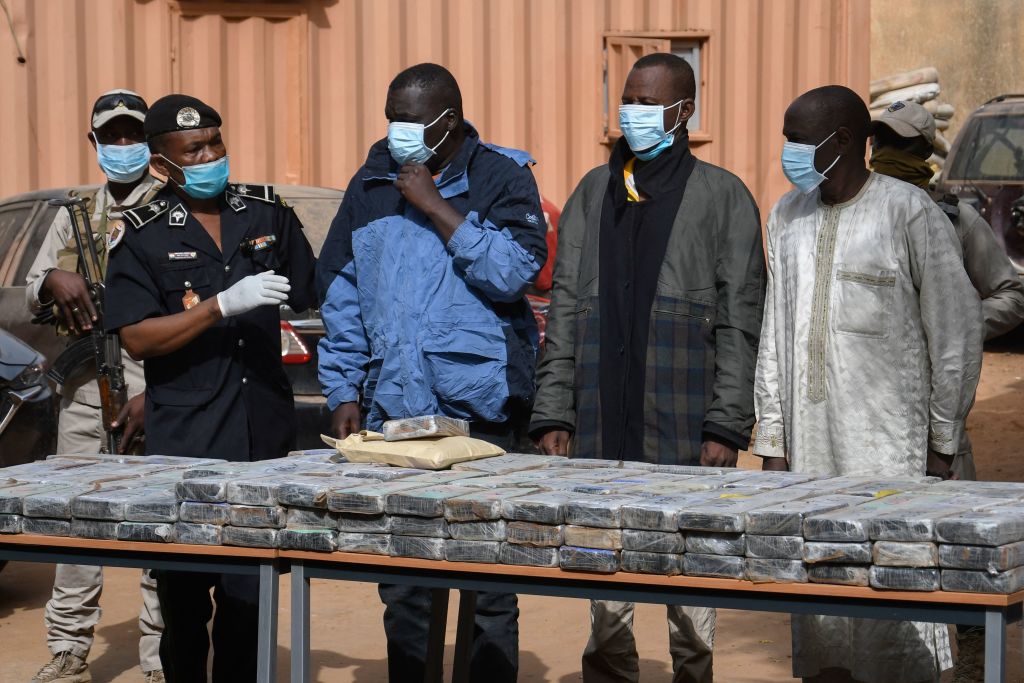ADF STAFF
The Sahel region has emerged as a new drug trafficking epicenter in recent years.
According to a United Nations Office on Drugs and Crime (UNODC) report, authorities seized 41 kilograms of cocaine in 2021. The number spiked to 1,466 kilograms the next year — an increase of 3,476%.
Annual estimates are not available for 2023, but 2.3 metric tons of cocaine had already been seized in Mauritania by June last year, and the trend of large drug busts has continued.
In April 2024, Senegalese authorities seized more than a metric ton of cocaine worth nearly $150 million from a truck headed for Mali — the largest land-based cocaine seizure in the country’s history.
Drug traffickers from South America often smuggle their products through West Africa en route to the Sahel, which historically has been a transit point for drugs headed to Europe.
The amount of drugs seized is not the amount of drugs trafficked, and the opaque nature of drug smuggling flows makes it difficult to determine exactly what quantity of illicit substances, including cannabis and opioids, pass through the region. However, the rising number of seizures suggests that more drugs than ever are flowing through West Africa and the Sahel.
Drug use across these areas also is rising as trafficking networks spill into local markets, according to Lucia Bird, director of the West Africa Observatory of Illicit Economies at the Global Initiative against Transnational Organized Crime.
“We’ve had reports of rising crack cocaine consumption in Agadez, Niger, driven by payment in kind,” Bird told Voice of America. “Smaller traffickers get paid in drugs and offload it onto local markets because they don’t have the contacts in more lucrative consumption destinations.”
One particular trend is the exchange of Moroccan hashish for South American cocaine via West Africa. Bird said this arrangement exploits differences in the prices of drugs across continents and increases the amount of drugs trafficked over land from West African ports across some of the Sahel’s most conflict-affected areas.
“Drug trafficking is well-established in the Sahel region — with detrimental consequences both locally and globally,” Amado Philip de Andrés, UNODC regional representative in West and Central Africa, said on the agency’s website. “The involvement of various armed groups in drug trafficking continues to undermine peace and stability in the region.”
Analysts are troubled by the possible involvement of rebel groups and terrorist organizations affiliated with al-Qaida and the Islamic State group (IS) in the continent’s illegal drug trade.
Terror groups such as Boko Haram, the Islamic State West Africa Province (ISWAP), and al-Qaida affiliate Jama’at Nusrat al-Islam wal-Muslimin, (JNIM) control vast swaths of Sahel territory. They occasionally battle one another as they seek to expand and entrench their control. Thus, they stand to benefit financially from drug trafficking, according to the Atlantic Council.
An April UNODC report found that drug trafficking continues to provide financial resources to rebel groups in the Sahel, including separatist groups in northern Mali.
“The time for decisive action to disrupt drug trafficking networks is now — including through evidence-based prevention and treatment services, strengthening legal frameworks and enhanced international cooperation at the law enforcement and prosecutorial levels,” de Andrés said on UNDOC’s website.
According to UNODC, corruption and money laundering enable drug trafficking, while recent arrests show that politicians, community leaders and leaders of armed groups facilitate the region’s drug trade.
“States in the Sahel region — along with the international community — must take urgent, coordinated, and comprehensive action to dismantle drug trafficking networks,” said Leonardo Santos Simão, special representative of the U.N. secretary-general for West Africa.

